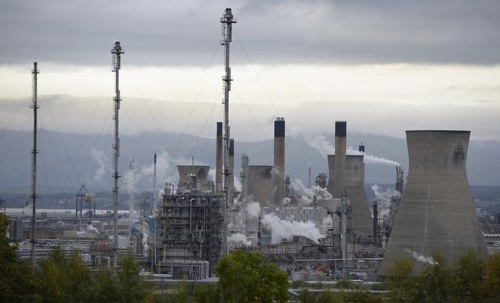Saving Scotland's only refinery a rare point of agreement in UK election race
Candidates from all of Scotland's major political parties competing in the UK general election are putting pressure on energy company Petroineos to delay the closure of Scotland's sole oil refinery at Grangemouth and save jobs.

Operating company Petroineos—a joint venture between INEOS and PetroChina—plans to close the 215,000-bpd Grangemouth refinery and convert it and the connected Finnart crude import terminal into fuel import hubs in 2025.
Any delay to the cessation of refining at Grangemouth would bolster UK crude demand and postpone a rise in fuel imports. The refinery on the Firth of Forth is important for global oil pricing as it processes mainly North Sea Forties and U.S. WTI crude, both of which help underpin the dated Brent global oil price benchmark.
Local politicians vying for a seat in parliament in Thursday's UK election are now calling to prolong refining until the site can be converted away from fossil fuel production, citing the need to maintain jobs on fears for the local economy.
"Time is needed to unlock the significant opportunities for green industries of the future," the Scottish National Party—which won in Grangemouth's constituency in the last election in 2019—said in its manifesto. "It is important that the skilled workforce is retained by extending refining for as long as possible."
Closing the refinery would not only threaten jobs at the plant but also come with energy security risks, analysts say, as it would leave Scotland dependent on imports for fuel supply.
Petroineos is yet to decide a transition date, a company spokesperson said, although when it announced the news last November it said refining could cease in spring 2025.
Labour party candidate Brian Leishman also pledged to extend the life of the refinery to enable a "proper transition," while the Scottish Conservatives' candidate Rachel Nunn—also in support of fighting its closure—branded the announcement to close the site a "hammer blow to the community."
Petroineos has already begun work on the terminal business, the spokesperson said, though the company is also in talks with the UK and Scottish governments to explore low-carbon fuel manufacturing options for the future.
Eugene Lindell, head of refined products at energy consultancy FGE, said a dependency on fuel imports could leave Scottish fuel prices exposed to extra freight costs, as diesel and jet imports in particular would likely have to be sourced from as far as the United States or Asia.
Trade union Unite, which represents 500 workers at the refinery, has criticized politicians' slow response to the closure, citing its strategic importance to Scotland's economy and energy security.






Comments